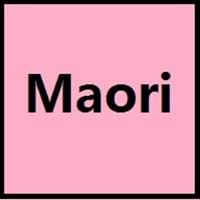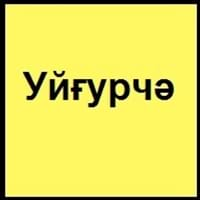Maori and Uyghur
Countries
New Zealand
China
National Language
New Zealand
China
Second Language
Not spoken in any of the countries
Not spoken in any of the countries
Speaking Continents
Australia, Oceania
Asia
Minority Language
Not spoken in any of the countries
Kazakhstan, Uzbekistan
Regulated By
Māori Language Commission
Working Committee of Ethnic Language and Writing of Xinjiang Uyghur Autonomous Region
Interesting Facts
- "E korao no New Zealand" was the first printed Maori book in 1815.
- The first newspaper in the Maori language was published in year 1842.
- Uyghur language has large quantity of loan words from Persian, Russian and Chinese.
- Uyghur was originally written with the Orkhon Alphabets.
Similar To
Tahitian Language
Uzbek Language
Derived From
Not Available
Gokturk Language
Alphabets in
Maori-Alphabets.jpg#200
Uyghur-Alphabets.jpg#200
Scripts
Latin
Arabic, Cyrillic, Latin
Writing Direction
Not Available
Left-To-Right, Vertical, Top-To-Bottom
Hello
Hello
Ässalamu läykum.
Thank You
Mauruuru koutou
rakhmat
How Are You?
E pēhea ana koe ?
Yakshimasiz? / Qandaq ahwalingiz?
Good Night
Night pai
Kachlikingz khayrilik bolsun
Good Evening
pai ahiahi
Kachlikingz khayrilik bolsun!
Good Afternoon
Afternoon pai
Not Available
Good Morning
Morning pai
Atiganlikingz khayrilik bolsun!
Sorry
Aroha mai
kachurung
Bye
poroporoaki
Khayr khosh
I Love You
Aroha ahau ki a koe
sizni yahshi kOrman
Excuse Me
tukua ahau
Kachurung
Dialect 1
South Island Māori
Turpan
Where They Speak
New Zealand
China
Dialect 2
Western North Island Maori
Hotan
Where They Speak
New Zealand
China
Dialect 3
Eastern North Island Maori
Lop Nur
Where They Speak
New Zealand
China
Speaking Population
Not Available
Native Name
te Reo Māori
Уйғур /ئۇيغۇر (ujġgur / uyghur)
Alternative Names
New Zealand Maori
Uighuir, Uighur, Uiguir, Uigur, Uygur, Weiwu’er, Wiga
French Name
maori
ouïgour
German Name
Maori-Sprache
Uigurisch
Pronunciation
Not Available
[ʊjʁʊrˈtʃɛ], [ʊjˈʁʊr tili]
Ethnicity
Māori people
Uyghur
Language Family
Austronesian Family
Turkic Family
Subgroup
Polynesian
Not Available
Branch
Not Available
Not Available
Early Forms
No early forms
Karakhanid, Chagatai, Eastern Turki
Standard Forms
Maori
Uyghur
Language Position
Not Available
Signed Forms
Not Available
Not Available
Scope
Individual
Not Available
ISO 639 6
Not Available
Not Available
Glottocode
maor1246
uigh1240
Linguasphere
No data Available
No data Available
Language Type
Living
Not Available
Language Linguistic Typology
Not Available
Not Available
Language Morphological Typology
Not Available
Not Available
All Maori and Uyghur Dialects
Most languages have dialects where each dialect differ from other dialect with respect to grammar and vocabulary. Here you will get to know all Maori and Uyghur dialects. Various dialects of Maori and Uyghur language differ in their pronunciations and words. Dialects of Maori are spoken in different Maori Speaking Countries whereas Uyghur Dialects are spoken in different Uyghur speaking countries. Also the number of people speaking Maori vs Uyghur Dialects varies from few thousands to many millions. Some of the Maori dialects include: South Island Māori, Western North Island Maori. Uyghur dialects include: Turpan , Hotan. Also learn about dialects in South American Languages and North American Languages.
Maori and Uyghur Speaking population
Maori and Uyghur speaking population is one of the factors based on which Maori and Uyghur languages can be compared. The total count of Maori and Uyghur Speaking population in percentage is also given. The percentage of people speaking Maori language is Not Available whereas the percentage of people speaking Uyghur language is 0.12 %. When we compare the speaking population of any two languages we get to know which of two languages is more popular. Find more details about how many people speak Maori and Uyghur on Maori vs Uyghur where you will get native speakers, speaking population in percentage and native names.
Maori and Uyghur Language Codes
Maori and Uyghur language codes are used in those applications where using language names are tedious. Maori and Uyghur Language Codes include all the international language codes, glottocodes and linguasphere.





